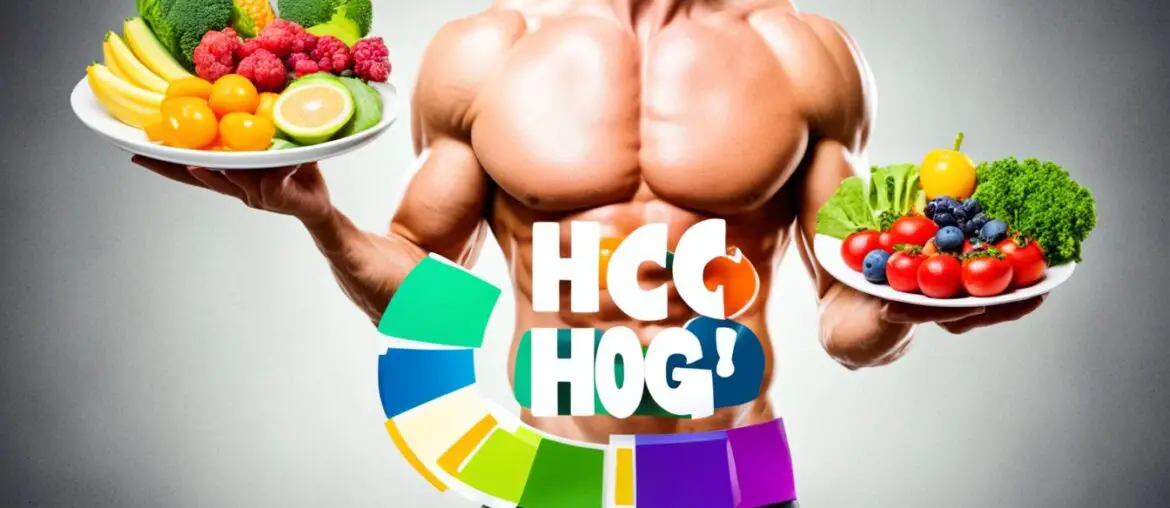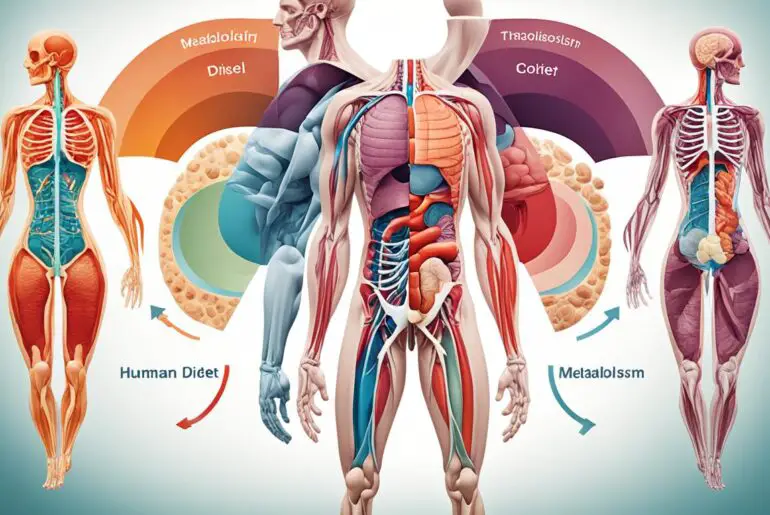Did you know that the HCG diet promises rapid weight loss of up to 1-2 pounds per day? It’s true. This controversial diet plan combines HCG supplements or hormone injections with an extremely low-calorie intake to supposedly boost your metabolism and help you shed those pounds fast. But before you jump on the HCG bandwagon, it’s important to separate fact from fiction and understand the potential risks and drawbacks of this weight loss method.
Key Takeaways:
- Rapid weight loss of 1-2 pounds per day is a claim made by the HCG diet plan.
- The diet combines HCG supplements or hormone injections with a very low-calorie intake.
- The FDA deems the HCG diet illegal and dangerous.
- Studies indicate that weight loss on the HCG diet is primarily due to extreme calorie restriction, not the HCG hormone itself.
- Consult with a healthcare professional before considering the HCG diet and explore safer and more effective weight loss methods.
What is HCG?
HCG, or human chorionic gonadotropin, is a hormone produced in high levels during pregnancy. It acts as a marker in home pregnancy tests, confirming the presence of the hormone in urine or blood. Beyond its role in pregnancy, HCG is also used as a fertility treatment for both men and women.
When it comes to weight loss, HCG has been proposed as a potential tool. The HCG diet combines HCG supplements or injections with a very low-calorie intake to achieve rapid weight loss. Advocates of this approach claim that HCG can boost metabolism and facilitate fat loss. However, it is essential to critically assess the scientific evidence supporting these claims.
My goal is to provide you with a comprehensive understanding of HCG, its uses, and its role in weight loss. Let’s explore the topic together.
The Role of HCG in Pregnancy and Fertility Treatment
During pregnancy, HCG is produced by the placenta and plays a crucial role in supporting the development of the fetus. Its presence in urine and blood confirms a pregnancy, making it an essential component of home pregnancy tests.
In fertility treatment, HCG can be used to stimulate ovulation in women and increase sperm production in men. By mimicking the activity of luteinizing hormone (LH), HCG promotes the release of eggs from the ovaries and boosts testosterone production, respectively. This makes it a valuable tool in addressing infertility issues.
The HCG Diet for Weight Loss
The HCG diet gained popularity as a weight loss method due to its purported ability to enhance metabolism and lead to rapid weight loss. The diet involves combining HCG supplements or injections with a very low-calorie intake, typically around 500 calories per day.
Proponents of the HCG diet claim that the hormone can suppress appetite, preserve lean muscle mass, and promote fat burning. However, it is important to note that there is limited scientific evidence to support these assertions. The weight loss achieved on the HCG diet is predominantly attributed to the severe calorie restriction rather than the HCG hormone itself.
It is crucial to consult with a healthcare professional before considering the HCG diet or any other weight loss method to ensure safety and effectiveness for your individual circumstances.
Understanding the scientific underpinnings behind weight loss methods is essential for making informed decisions about our health and well-being.” – Dr. Jane Johnson, MD
| Prospective Benefits of HCG | Drawbacks and Considerations |
|---|---|
|
|
How HCG Affects Metabolism
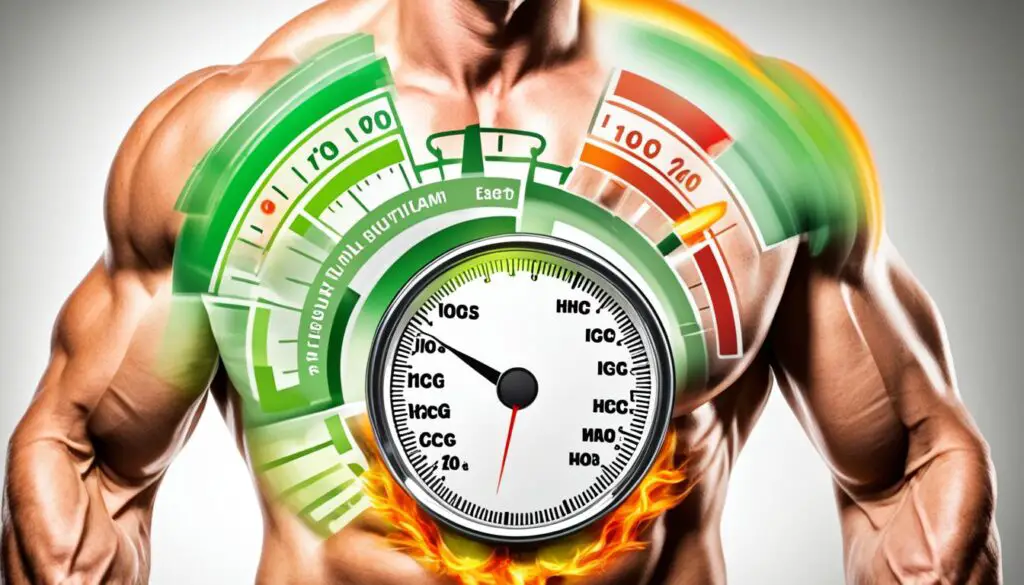
HCG is often believed to have a significant impact on metabolism and its ability to promote weight loss. However, recent studies have shown that the weight loss achieved through the HCG diet is primarily a result of calorie restriction rather than the direct effects of the HCG hormone itself.
There is currently no scientific evidence to support the claim that HCG specifically enhances metabolism or leads to fat loss without muscle loss. Instead, the calorie restriction associated with the HCG diet plays a central role in the weight loss experienced by individuals following this plan.
It is important to note that calorie restriction can indeed lead to weight loss. When the body receives fewer calories than it needs, it must turn to its stored fat reserves to meet its energy demands, resulting in weight loss. However, this weight loss is a result of overall calorie reduction rather than any unique effects of HCG on metabolism.
“The weight loss achieved through the HCG diet is primarily a result of calorie restriction rather than the direct effects of the HCG hormone itself.”
While the HCG diet may yield rapid weight loss initially, it is crucial to consider the potential risks and drawbacks associated with severe calorie restriction. Consultation with a healthcare professional is highly advised before embarking on any weight loss journey, including the HCG diet.
HCG and Calorie Restriction
The HCG diet recommends an extremely low-calorie intake, typically around 500 calories per day. This severe calorie restriction puts the body in a state of energy deficit, leading to weight loss. However, it is important to note that such a low-calorie intake is significantly below the recommended daily calorie intake for most individuals.
It is essential to prioritize a balanced and sustainable approach to weight loss that includes adequate and nutritious calorie intake. Restricting calories to such an extreme level can have adverse effects on overall health and well-being.
Considering Alternative Weight Loss Methods
There are numerous safe and effective alternatives to the HCG diet for weight loss. These alternatives include following a balanced and nutritious diet, incorporating regular physical activity, and seeking guidance from healthcare professionals or registered dietitians.
By focusing on long-term, sustainable weight loss methods, individuals can achieve their weight loss goals while prioritizing overall health and well-being. Consulting with a healthcare professional is essential to develop a personalized weight loss plan that is safe, effective, and suitable for individual needs and goals.
| Pros of the HCG Diet | Cons of the HCG Diet |
|---|---|
| – Potential for rapid weight loss | – Severe calorie restriction |
| – Some individuals may find it manageable in the short term | – Limited food choices |
| – Potential for nutrient deficiencies | |
| – Lack of scientific evidence to support claimed metabolic effects of HCG |
The Three Phases of the HCG Diet
The HCG diet consists of three distinct phases designed to optimize weight loss and promote long-term maintenance. These phases, namely the loading phase, the weight loss phase, and the maintenance phase, work together to achieve sustainable results.
1. Loading Phase:
The loading phase, also known as the “gorging phase,” marks the beginning of the HCG diet journey. During this phase, individuals are encouraged to consume high-calorie, high-fat foods to build up their body’s fat stores. This phase typically lasts for two days and is accompanied by the initiation of HCG supplementation.
This initial period of indulgence may seem counterintuitive, but it serves a strategic purpose. By overloading the body with calories and fats, it prepares the metabolism for the subsequent phases of the diet, where calorie intake will be drastically restricted.
“The loading phase kickstarts the body’s fat-burning mechanisms and sets the stage for rapid weight loss during the following phases.”
2. Weight Loss Phase:
The weight loss phase is the most crucial period of the HCG diet and typically lasts between three and six weeks. During this phase, individuals consume a very low-calorie diet of only 500 calories per day, while continuing their HCG supplementation. The combination of restricted calorie intake and HCG supplementation is believed to trigger metabolic changes that facilitate rapid weight loss.
The low-calorie diet primarily consists of lean proteins, vegetables, and a limited quantity of fruits. It is important to closely adhere to the prescribed food list and portion sizes to maximize results. This phase requires discipline and commitment, as it may involve significant adjustments to dietary habits and behaviors.
“The weight loss phase harnesses the body’s fat stores, resulting in significant weight loss while preserving muscle mass.”
3. Maintenance Phase:
The maintenance phase, also known as the stabilization phase, follows the weight loss phase and typically spans three weeks. During this phase, calorie intake gradually increases, and individuals are advised to maintain a low-sugar, low-starch diet. This phase aims to stabilize the weight loss achieved during the previous phase and reset the body’s metabolism.
While calorie intake increases, it is crucial to avoid reverting to previous eating habits and to make informed choices about food quality and quantity. This phase serves as a transition between the weight loss phase and subsequent lifestyle changes.
During the maintenance phase, it is essential to focus on establishing healthy eating patterns, incorporating regular physical activity, and implementing sustainable lifestyle changes to maintain the weight loss achieved during the HCG diet.
Overall, the three phases of the HCG diet provide a structured approach to weight loss and long-term maintenance. The loading phase prepares the body for calorie restriction, the weight loss phase facilitates rapid fat loss, and the maintenance phase stabilizes and reinforces healthy habits. It is important to consult with a healthcare professional before embarking on the HCG diet to ensure its suitability and safety for individual circumstances.
Approved and Prohibited Foods on the HCG Diet
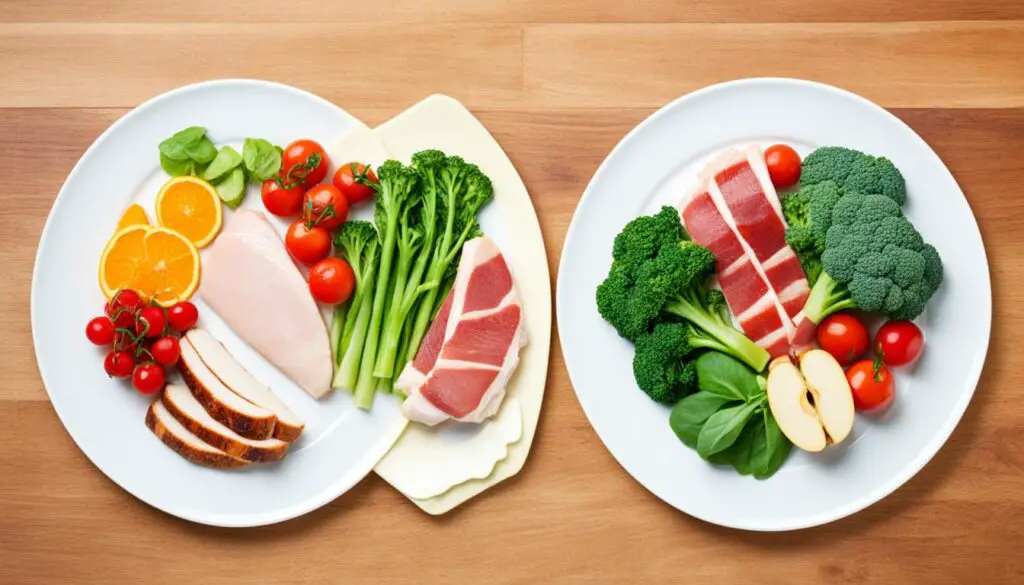
When following the HCG diet, it is important to adhere to a specific list of approved and prohibited foods. These guidelines help ensure that you are consuming the right nutrients while maintaining a calorie-restricted diet. Here is a breakdown of the foods that are allowed and the ones that should be avoided:
Approved Foods:
- Lean Protein: Chicken breast, turkey, fish (such as cod, haddock, or halibut), and lean cuts of beef are all approved sources of protein on the HCG diet. It is important to choose lean options to minimize calorie intake while still getting the necessary nutrients.
- Vegetables: Certain vegetables are allowed on the HCG diet, including spinach, lettuce, cucumbers, celery, asparagus, and cabbage. These vegetables provide essential vitamins and minerals.
- Fruits: Small portions of fruits such as apples, oranges, strawberries, and grapefruits are permitted on the HCG diet. These fruits offer natural sugars and fiber.
- Seasonings: To add flavor to your meals, you can use approved seasonings like herbs (such as basil, cilantro, and parsley) and spices (such as garlic powder, onion powder, and paprika). Avoid seasonings that contain added sugars or excessive amounts of sodium.
- Beverages: While on the HCG diet, it is important to stay hydrated. You can drink coffee, tea (green or herbal), and water. These beverages help to quench your thirst and keep you feeling satisfied.
Prohibited Foods:
- Dairy: Dairy products, including milk, cheese, butter, and yogurt, are not allowed on the HCG diet due to their high calorie and fat content.
- Carbohydrates: Foods that are rich in carbohydrates, such as bread, pasta, rice, and potatoes, should be avoided on the HCG diet. These foods can contribute to weight gain and hinder your weight loss progress.
- Fats and Oils: Oils, butter, and other sources of fats should be eliminated from your diet while on the HCG diet. These high-calorie foods can prevent your body from entering a state of ketosis, which is necessary for the rapid weight loss associated with the HCG diet.
- Sugary Foods: Foods that contain added sugars, such as candies, sodas, and desserts, are strictly prohibited on the HCG diet. These foods can spike your blood sugar levels and hinder your weight loss efforts.
- Desserts: Sweet treats and desserts, including cakes, cookies, and ice cream, should be avoided on the HCG diet. These foods are high in calories, sugar, and fat, which can sabotage your progress.
By following these guidelines and making informed food choices, you can maximize the benefits of the HCG diet and achieve your weight loss goals. Remember to consult with a healthcare professional before starting any diet or weight loss program.
| Approved Foods | Prohibited Foods |
|---|---|
|
|
Safety and Side Effects of the HCG Diet
The HCG diet, although popular for its claimed fast weight loss results, poses significant safety concerns and potential side effects. It is essential to understand the risks associated with this diet before considering it as a weight loss option.
The HCG diet is not approved by the FDA and is considered unsafe. The use of HCG supplements or injections for weight loss is illegal in the United States. These products are classified as illegal drugs and are not supported by scientific evidence for their effectiveness in promoting weight loss.
Side effects of the HCG diet can range from mild to severe. Common side effects include headaches, fatigue, and depression. More serious health risks can also occur, including electrolyte imbalances, gallstone formation, and hormonal disruptions.
It is crucial to take these safety concerns seriously and consult with a healthcare professional before considering the HCG diet. They can provide guidance and evaluate the risks associated with this diet in relation to your overall health and weight loss goals.
The FDA’s Stance on HCG for Weight Loss
“HCG products for weight loss are illegal and are marketed and sold as unapproved drugs by fraudulent companies. It is crucial for consumers to avoid using these products, as they can lead to serious health complications.” – FDA
HCG Diet Safety Guidelines
If you still choose to pursue the HCG diet despite the safety concerns, it is important to follow these guidelines:
- Consult with a healthcare professional: They can help monitor your progress and minimize the risk of potential complications.
- Use caution when purchasing HCG products: Be aware of illegal and counterfeit products on the market. Only purchase HCG products from reputable sources and under the guidance of a healthcare professional.
- Monitor your health: Pay attention to any changes in your physical or mental well-being while on the HCG diet. Report any concerns to your healthcare professional immediately.
While the HCG diet may promise quick weight loss, it is important to prioritize your safety and consider alternative weight loss methods that are supported by scientific evidence and approved by healthcare professionals.
Alternatives to the HCG Diet for Weight Loss
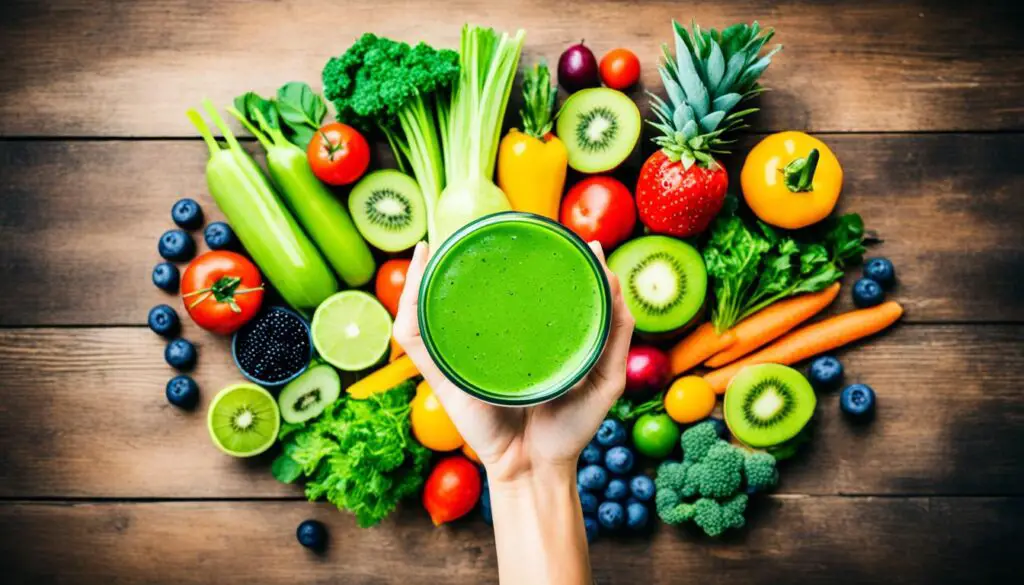
When it comes to weight loss, there are numerous safe and effective alternatives to the HCG diet. These alternatives focus on sustainable and healthy weight loss methods, guided by healthcare professionals or registered dietitians.
Following a Balanced and Nutritious Diet: One of the most important weight loss methods is to adopt a balanced and nutritious diet. This involves consuming a variety of nutrient-dense foods, such as lean proteins, whole grains, fruits, and vegetables. By prioritizing a well-rounded diet, you can ensure you’re getting the required nutrients while maintaining a calorie deficit for weight loss.
Increasing Physical Activity: Regular physical activity is essential for weight loss and overall health. Engaging in aerobic exercises, strength training, and other forms of physical activity can help burn calories, build muscle, and improve your metabolism. Aim for at least 150 minutes of moderate-intensity exercise per week.
Seeking Guidance from Healthcare Professionals: Consulting with a healthcare professional or registered dietitian is a wise choice when embarking on a weight loss journey. They can provide personalized recommendations, create a tailored meal plan, and help you navigate potential challenges or obstacles along the way.
By utilizing these weight loss methods, you can achieve safe and sustainable weight loss while prioritizing your health and well-being.
Why Choose Safe and Sustainable Weight Loss Methods?
Prioritizing safe and sustainable weight loss methods is crucial for long-term success. These methods not only help you shed pounds but also improve your overall health and well-being. Crash diets or fad weight loss plans may promise quick results, but they often lead to unsustainable practices or even health risks. By choosing safe and sustainable weight loss methods, you can achieve your goals without compromising your health.
Risks and Considerations of the HCG Diet
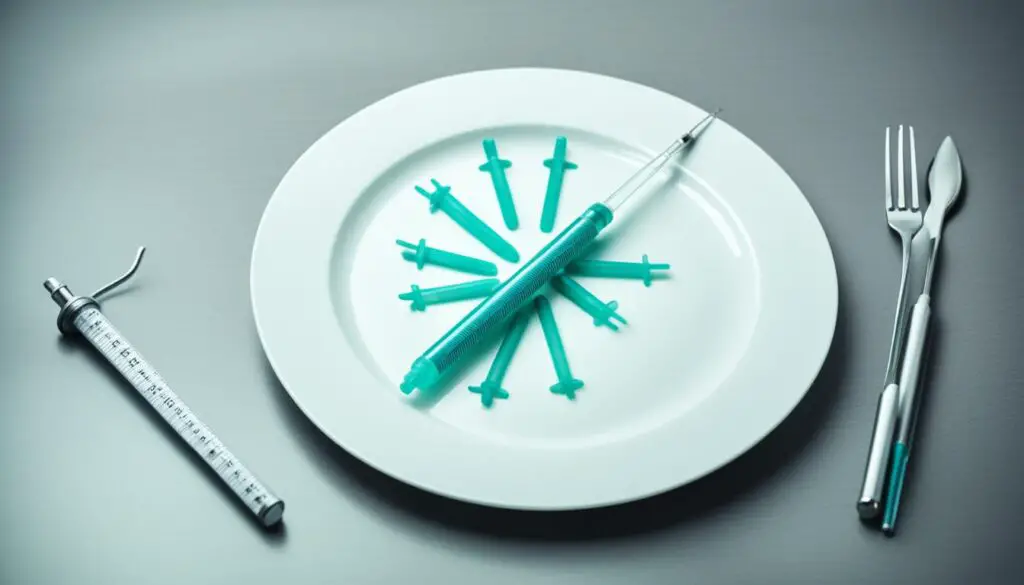
The HCG diet, with its promise of rapid weight loss, must be approached with caution due to various risks and considerations. It is crucial to be well-prepared, monitor your progress, and seek proper guidance throughout the journey to minimize potential drawbacks and ensure your well-being.
Nutrient Deficiencies
One potential risk of the HCG diet is the potential for nutrient deficiencies. The extreme calorie restriction involved in the diet may limit the intake of essential vitamins, minerals, and macronutrients needed for overall health. Proper preparation, including consulting a healthcare professional or registered dietitian, can help identify potential deficiencies and develop strategies to address them.
Disordered Eating Patterns
Following the HCG diet may result in the development of disordered eating patterns. The strict calorie restriction and limited food options can lead to an unhealthy relationship with food, potential binge-eating episodes, or an obsessive focus on weight and body image. Continuous monitoring and support, both from healthcare professionals and loved ones, can help individuals navigate these potential psychological effects.
Psychological Effects of Severe Calorie Restriction
The severe calorie restriction involved in the HCG diet can have psychological effects on individuals. Rapid weight loss and extreme dietary measures may trigger feelings of fatigue, irritability, mood swings, and difficulty concentrating. It is essential to monitor these effects closely and seek professional guidance to address any potential mental health concerns that may arise.
Proper Guidance and Monitoring
Given the risks associated with the HCG diet, it is crucial to have proper guidance and monitoring throughout the process. Consulting a healthcare professional before starting the diet can help ensure that it is safe for your individual circumstances and that appropriate precautions are taken to minimize any potential risks. Regular check-ins and monitoring during the diet can help detect any adverse effects early on and adjust the approach if necessary.
While the HCG diet may offer rapid weight loss, it is important to weigh the risks and considerations before embarking on this weight loss method. Consulting a healthcare professional and seeking proper guidance and monitoring throughout the process can help you make an informed decision and prioritize your overall health and well-being.
Conclusion
The HCG diet is a highly controversial weight loss plan that involves severe calorie restriction and the use of HCG supplements or injections. While it may lead to rapid weight loss, its safety and effectiveness are questionable, and it is not recommended by healthcare professionals.
Instead, it is crucial to explore safer and more sustainable weight loss methods. Consult a healthcare professional who can provide personalized guidance and recommendations based on your specific needs and goals. They can help you develop a balanced and nutritious diet plan, create an exercise routine that suits your lifestyle, and support you in making long-term lifestyle changes.
Remember, weight loss is not just about the numbers on the scale. It’s about improving your overall health and well-being. By focusing on healthy eating, regular physical activity, and seeking professional guidance, you can achieve your weight loss goals in a safe and sustainable way. Take charge of your health and consult a healthcare professional today to embark on your journey towards a healthier you.
FAQ
What is the HCG diet plan?
The HCG diet plan is a weight loss plan that combines HCG supplements or hormone injections with an extremely low-calorie diet. It claims to boost metabolism and lead to rapid weight loss.
What is HCG?
HCG, or human chorionic gonadotropin, is a hormone produced in high levels during pregnancy. It is also used as a marker in home pregnancy tests and can help treat fertility issues in both men and women.
How does HCG affect metabolism?
HCG is believed to boost metabolism and aid in weight loss. However, studies have shown that weight loss on the HCG diet is primarily due to drastic calorie restriction, not the HCG hormone itself.
What are the three phases of the HCG diet?
The HCG diet consists of the loading phase, the weight loss phase, and the maintenance phase. During the loading phase, individuals consume high-calorie, high-fat foods while starting HCG supplementation. The weight loss phase involves consuming only 500 calories per day while continuing HCG supplementation. The maintenance phase gradually increases calorie intake but restricts sugar and starch for three weeks.
What foods are approved and prohibited on the HCG diet?
The HCG diet allows for lean proteins such as chicken, fish, and lean beef, along with specific vegetables and fruits. Approved seasonings include herbs and spices, while beverages are limited to coffee, tea, and water. Prohibited foods include dairy, carbohydrates, fats and oils, sugary foods, and desserts.
Is the HCG diet safe?
The HCG diet is not approved by the FDA and is considered unsafe. The use of HCG supplements or injections for weight loss is illegal in the United States. The diet carries various risks and side effects, including nutrient deficiencies and disordered eating patterns.
Are there alternatives to the HCG diet for weight loss?
Yes, there are many safe and effective alternatives to the HCG diet for weight loss. These include following a balanced and nutritious diet, increasing physical activity, and seeking guidance from a healthcare professional or registered dietitian.
What are the risks and considerations of the HCG diet?
The HCG diet carries various risks, including nutrient deficiencies, disordered eating patterns, and psychological effects of severe calorie restriction. It is crucial to be under proper medical supervision and guidance when following the HCG diet.
Is the HCG diet an effective weight loss method?
The HCG diet is a highly controversial weight loss plan. While it may lead to rapid weight loss, its safety and effectiveness are questionable. It is not recommended by healthcare professionals, and there are safer and more sustainable weight loss methods available.

